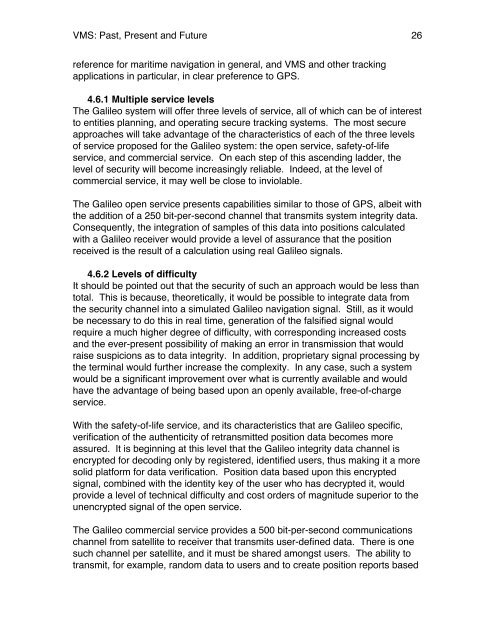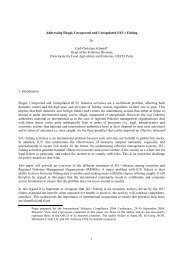Fishing Vessel Monitoring Systems: Past, Present and Future
Fishing Vessel Monitoring Systems: Past, Present and Future
Fishing Vessel Monitoring Systems: Past, Present and Future
Create successful ePaper yourself
Turn your PDF publications into a flip-book with our unique Google optimized e-Paper software.
VMS: <strong>Past</strong>, <strong>Present</strong> <strong>and</strong> <strong>Future</strong> 26<br />
reference for maritime navigation in general, <strong>and</strong> VMS <strong>and</strong> other tracking<br />
applications in particular, in clear preference to GPS.<br />
4.6.1 Multiple service levels<br />
The Galileo system will offer three levels of service, all of which can be of interest<br />
to entities planning, <strong>and</strong> operating secure tracking systems. The most secure<br />
approaches will take advantage of the characteristics of each of the three levels<br />
of service proposed for the Galileo system: the open service, safety-of-life<br />
service, <strong>and</strong> commercial service. On each step of this ascending ladder, the<br />
level of security will become increasingly reliable. Indeed, at the level of<br />
commercial service, it may well be close to inviolable.<br />
The Galileo open service presents capabilities similar to those of GPS, albeit with<br />
the addition of a 250 bit-per-second channel that transmits system integrity data.<br />
Consequently, the integration of samples of this data into positions calculated<br />
with a Galileo receiver would provide a level of assurance that the position<br />
received is the result of a calculation using real Galileo signals.<br />
4.6.2 Levels of difficulty<br />
It should be pointed out that the security of such an approach would be less than<br />
total. This is because, theoretically, it would be possible to integrate data from<br />
the security channel into a simulated Galileo navigation signal. Still, as it would<br />
be necessary to do this in real time, generation of the falsified signal would<br />
require a much higher degree of difficulty, with corresponding increased costs<br />
<strong>and</strong> the ever-present possibility of making an error in transmission that would<br />
raise suspicions as to data integrity. In addition, proprietary signal processing by<br />
the terminal would further increase the complexity. In any case, such a system<br />
would be a significant improvement over what is currently available <strong>and</strong> would<br />
have the advantage of being based upon an openly available, free-of-charge<br />
service.<br />
With the safety-of-life service, <strong>and</strong> its characteristics that are Galileo specific,<br />
verification of the authenticity of retransmitted position data becomes more<br />
assured. It is beginning at this level that the Galileo integrity data channel is<br />
encrypted for decoding only by registered, identified users, thus making it a more<br />
solid platform for data verification. Position data based upon this encrypted<br />
signal, combined with the identity key of the user who has decrypted it, would<br />
provide a level of technical difficulty <strong>and</strong> cost orders of magnitude superior to the<br />
unencrypted signal of the open service.<br />
The Galileo commercial service provides a 500 bit-per-second communications<br />
channel from satellite to receiver that transmits user-defined data. There is one<br />
such channel per satellite, <strong>and</strong> it must be shared amongst users. The ability to<br />
transmit, for example, r<strong>and</strong>om data to users <strong>and</strong> to create position reports based

















